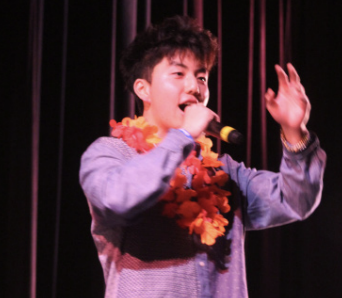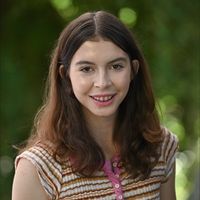In the wake of incidents involving hate symbols and offensive language, Branson’s leadership and community members have been working to address the harm, reaffirm values and promote accountability across campus.
The first report came several weeks ago, when a student approached Jeff Symonds, the dean of academics, about swastikas carved onto tables in Study Hall 3. In the following week, more students came forward with similar issues and the n-word was found on a desk in Study Hall 5.
These incidents, given their timing and nature, sparked immediate concern among students and faculty. Symonds responded quickly, leading an assembly for sophomores, whose U.S. History Honors courses are housed in those rooms. Later, he sent an email for the entire community stating that the swastika “negates the humanity of many of our community members” and offering support to anyone impacted.
In an interview, Symonds outlined the school’s collective response, involving discussions “in admin, as a full faculty, and in the chairs group,” along with several one-on-one conversations with students and parents.
“Immediate discussions took place among the administration, faculty, student affinity groups and parent community,” Symonds said.
Dave Reiter, a math teacher at Branson who identifies as Jewish, stepped forward during an all-school assembly to share personal reflections on the emotional impact of seeing the symbols.
“I don’t know who drew the swastikas or why,” Reiter said. “My best guess is it’s someone trying to be outrageous without understanding the full weight of what they were doing.”
Reiter’s hope was that by letting “people see how seeing that affects someone like [him]” they might more fully understand the consequences of their actions.
Symonds highlighted the delicate balance at Branson: “[The school] is both very strong because the people who are there value it [and] fragile because it doesn’t take many people who don’t really get what [the school] is to erode at the foundation.”
He added, “To be a truly great place takes work.”
This isn’t the first time Branson has faced such challenges. U.S. history teacher Malik Ali has 21 years of experience teaching at Branson and reflected on prior incidents similar to recent events.
He recalled when, in 2018, students used the n-word in ways that became increasingly disrespectful.
“Students had voiced their concerns, and it continued,” he said, describing the behavior as “careless, flippant and reckless.”
However, he emphasized that those incidents also sparked productive conversations, leading to learning opportunities and reflection.
In his teaching across American history, politics and pop culture, Ali has worked to contextualize offensive language and symbols, helping students understand their historical weight.
“There are certainly opportunities and discussions for both,” he said, noting that antisemitic messages are discussed up in Brandon’s Modern World History and World War II classes, while anti-Black language is considered in U.S. History Honors and various other electives.
Ali pointed out that the larger cultural climate, where offensive symbols and slurs often circulate without care, inevitably seeps into the school environment.
“I don’t think our larger culture necessarily promotes us being our best selves in the way we care and think about each other,” he said.
It is important to remember that minor disrespectful behaviors like cheating or vandalism can snowball, but hate symbols are categorically different.
“Vandalism is thoughtless,” Symonds said, “but putting a hate symbol on a table is … a fundamentally unconscionable, indefensible thing to do.”
Symonds noted that “throwing your trash on the ground” is different from “putting a hate symbol on a table. “They’re related, but they’re importantly different.”
Reiter recalled another similar trend from past years. About 10 years ago, when Branson students created a private Facebook group and posted racist and antisemitic phrases. He believed that these students were trying to “one-up each other,” and the exposure of their actions led to the founding of Jew Crew, Branson’s Jewish affinity space.
As Branson looks to move forward, faculty stress the importance of students feeling empowered to speak up.
Symonds said, “I would hope that … if somebody knows who did that, five people pull them aside and be like, knock it off.”
Ali echoed this call for courage among students. He urged students to have the “courage and sense of principle” to confront their peers when harmful language or symbols appear. Challenging your peers, he said, can be hard “but they’re also some of the most important.”
Both teachers and administrators agree: While physical symbols like vandalized tables can be removed, the deeper challenge is fostering a culture where such actions are unthinkable.
Reiter said, “I’m just hoping that the hateful graffiti stops [and] the individual or group responsible [acts] differently in the future.”


